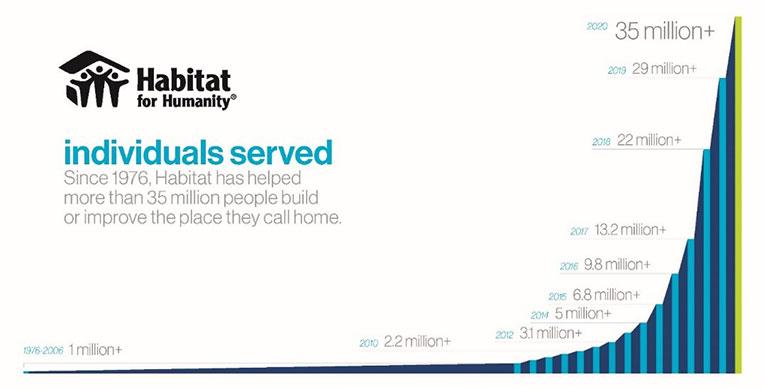Habitat serves more than 5.9 million people globally in 2020
Fiscal year 2020 annual report is now available
MANILA (Nov. 18, 2020) — A safe, decent and healthy home has been the first line of defense for families around the globe during the COVID-19 pandemic. Thanks to the work of Habitat for Humanity, more than 5.9 million people accessed better housing in the last year, according to the global nonprofit’s fiscal year 2020 annual report released today. In Asia and the Pacific region, Habitat has helped more than 1.9 million people have access to better housing.
The report highlights how the organization addressed the need for safe, decent and affordable shelter worldwide, under mounting headwinds from the pandemic that restricted some of the ways Habitat traditionally executes its mission.
With many of the organization’s usual activities affected by the spread of COVID-19 over the course of the fiscal year (July 1, 2019 – June 30, 2020), its affiliated organizations in more than 70 countries and 1,100 communities across the United States found ways to adapt and continue serving.
“While this year has brought many challenges and heartaches to communities we serve across the world, I’m grateful that Habitat has had an opportunity to serve so many families when they needed it most,” said Jonathan T.M. Reckford, CEO of Habitat for Humanity International. “At Habitat, we are religious about our principles, but not about our tactics. I’ve been inspired by the ingenuity and flexibility of Habitat organizations around the world who quickly adapted to the crisis and built new strategies to carry out our mission. We are clear-eyed that the future will bring more headwinds, but I know that the people who enable our mission — our donors, staff, volunteers, advocates and the people we serve — are as dedicated as ever to our vision of a world where everyone has a decent place to live.”
While the COVID-19 pandemic greatly curtailed traditional volunteer experiences, with build sites largely closed to general volunteers since February, Habitat still benefited from the hands and hearts of nearly 1 million volunteers before the shutdowns began.
In fiscal year 2020, Habitat for Humanity International reported US$287 million in revenue, along with an estimated US$2.3 billion in total revenue through the organization’s federated network in the U.S. and around the world. Program spending at Habitat for Humanity International accounted for 74% of total expenses, including the distribution of US$193 million in cash and donated product to Habitat organizations.
The 5.9 million people who accessed new or improved housing through new home construction, rehabilitation, incremental improvements and repairs helped the organization reach the milestone of 35 million people served since its founding in 1976.

Habitat views access to safe, decent, and affordable housing as the cornerstone of strong, thriving communities. Senghouch, Cheat, and their two young children are among the many families served by Habitat’s global network. Senghouch’s family built a new home with the help of Habitat for Humanity Cambodia. Living in a small village in Khsach Kandal district, Cambodia, Senghouch is now able to work comfortably on her weaving loom inside her home to earn more income for the family’s daily expenses. The training in water, sanitation and hygiene practices conducted by Habitat has also helped to improve the children’s overall health.
In fiscal year 2020, Habitat continued to enable access to better housing for millions through its Terwilliger Center for Innovation in Shelter. To address the impacts of COVID-19, the Center developed nearly 40 activities, from issuing small grants to shelter-related innovators to prototyping temporary shelter concepts.
Habitat’s impact is felt well beyond the individuals that it serves. Habitat’s work promotes and drives social and economic outcomes by stimulating other sectors of the economy through spending and job creation associated with home construction, renovation and repair.
Findings from a recent Habitat report determined that emerging economies that have been struggling to recover from the COVID-19 pandemic may be significantly underestimating their housing sector‘s contribution to the gross domestic product of a country. The report, titled Cornerstone of Recovery: How Housing Can Help Emerging Market Economies Rebound from COVID-19, found that inclusive financial interventions in the housing sector can stimulate economies while also improving the wellbeing of families through healthier housing conditions.
Habitat is continuing its work in the face of growing need. Even before the pandemic, more than 1.6 billion people globally lack adequate shelter. The economic impact of COVID-19 has substantially increased the number of people struggling with the impossible choice of covering the cost of housing and other basic needs, like food, water, heat and health care.
“These are our friends, our family and our neighbors, who now more than ever, could use the hand up that we can offer,” Reckford said. “The pandemic may have spread us apart physically, but we have never been more united it our work to build strength through shelter.”
To learn more and to read the full 2020 annual report, visit habitat.org/multimedia/annual-report-2020
